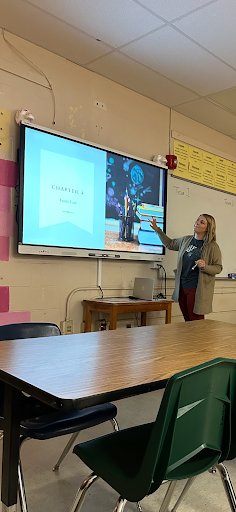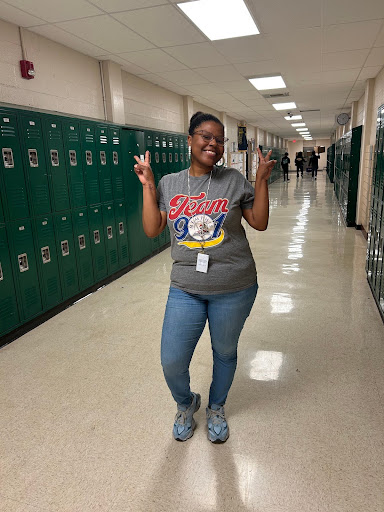Are they your friend or your boss? Your bud or just your teacher? Those are some of the questions many students face, whether they realize it or not. Building relationships with teachers is an important part of having a successful high school career, but at what point is the line between a teacher and student versus two friends crossed?
Among some of the younger teachers on the White Station High School (WSHS) staff, age can be a useful tool for connecting with students and applying effective teaching techniques. Anatomy and Physiology and Sociology teacher Katelyn Cherry has experienced some of the benefits and consequences of being closer in age to her students.
“Honestly my age is a good thing at times,” Cherry said. “My entire Sociology [class] today was [about] what are our problems in education and the way that I’m able to communicate with certain classes really shows that there is not that much difference between our generations. There’s some, but as far as just talking things out, [my age] can be a good thing. And at the same time, if you go down that path [of being their friend ], sometimes you do lose the train of ‘Oh, they are older than me, they are my teacher.”
Though other factors could influence classroom dynamics, problems within a classroom may be attributed to the age difference between students and teachers. Algebra II teacher Christina Shute does not believe that being a younger teacher means she is better able to connect with students than other teachers, though she has also experienced the problems associated with being closer in age to her students.
“Sometimes [I have problems] at the beginning of the year establishing norms of the classroom and just recognizing that just because I’m young, the expectations are not going to be any different,” Shute said.
Shute has a Bachelor’s degree in Mathematics and is almost finished getting her Master’s degree in Teaching while simultaneously teaching at WSHS. Shute has been able to work closely with her fellow Algebra II teachers who have been teaching longer than she has.
“I’m really lucky to have the fellow Algebra II teachers that I have,” Shute said. “While they have way more experience than me, they still listen to me and value me as a professional, while also offering their expertise and their guidance.”
In addition to being a younger teacher at, Harris is also an alumnus of WSHS. Many members of the staff from Harris’ time as a student are still teaching at WSHS. As a second-year teacher, Harris has had to adjust to the new dynamic between her and her fellow educators.
“I feel like my challenge is a bit unique in that I went [to school] here, so a lot of the teachers that taught me still go here,” Harris said. “Ms. Holland was my principal, so it’s just been an adjustment seeing myself as a colleague and not as a student. Not seeing them in an authoritative role, but seeing them as my colleague and my [boss].”

As techniques, practices and values change as time goes on, teaching methods at WSHS also continue to evolve. Cherry values the experience of her fellow teachers as she continues to develop her style of teaching.
“I feel thankful for the older teachers that are around me,” Cherry said. “Some of them are very welcoming and show you the ins and outs to certain things, but it’s also hard being a younger teacher with the older ones because, in the most respectful way, you see them do things they’re used to because they’ve done it for so long, and you’re trying to not do that. You’re trying to be different about it.”
Harris feels like she is more able to understand the trends of her students because of her age. This understanding has helped her in her role as the sponsor of the Communications Team.
“I feel like I’m able to approach my job as more of a big sister or big cousin, instead of a mom or dad because I’m not old enough to be anybody’s mom,” Harris said. “I’m pretty sure I have students tell me stuff that they are not saying in other people’s classrooms.”
Outside of school, Shute enjoys cooking, reading and hanging out with friends. Many teachers have to deal with balancing school work and personal life during their careers.
“Every year, [school interferes with my personal life] a little bit less,” Shute said. “That’s been one of the things I’m working on, how to do my job well, but then when I’m not here, to stop working, [and] have some balance between work life and outside of work.”
Cherry believes that the motivation she puts into her work impacts her students and their initiative. She does not think that her age affects her ability to motivate students to put effort into her class and assignments.
“Some do [know that I put in effort] and some don’t,” Cherry said. “The only reason I say that is some have verbally said it to me, that they’re trying, and it shows through their work. You’re always going to have that batch that says, ‘Truth be told, I didn’t want this class, so I’m not going to try.’”
Between filming and publishing content for the school’s media pages, the White Station Communications Team takes up more of Harris’ time than her class work. Harris tries not to grade assignments at home, though she does not mind the commitment her roles require of her.
“I’ve never stayed at a job for more than a year, and it’s usually because it’s like, ‘Alright, what’s next,’ or I don’t feel like I belong or I just don’t enjoy it,” Harris said. “This is my first job [where] I came back for a second year. I’ve never felt as supported as I do here.”




































